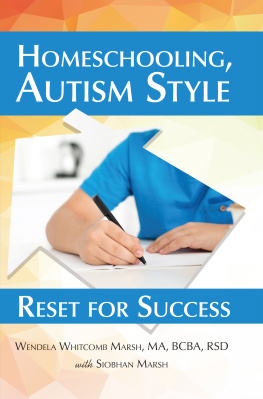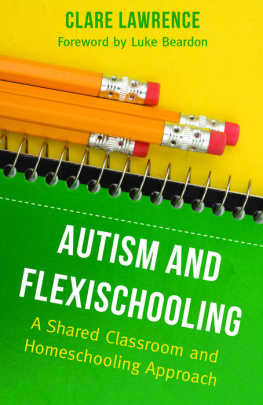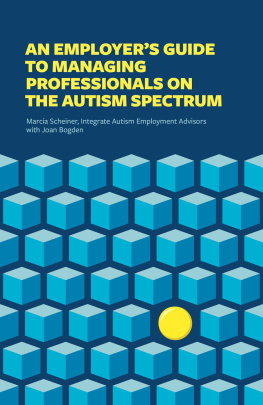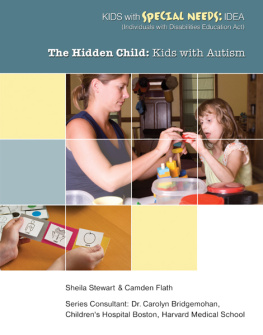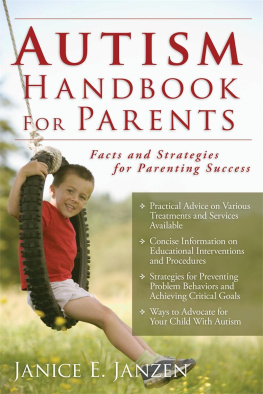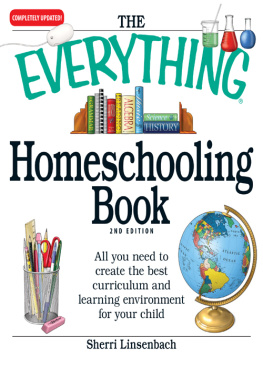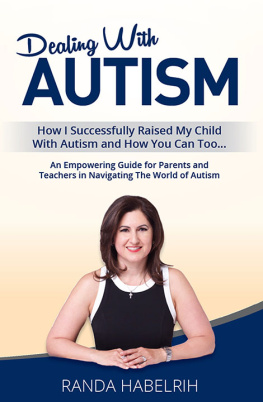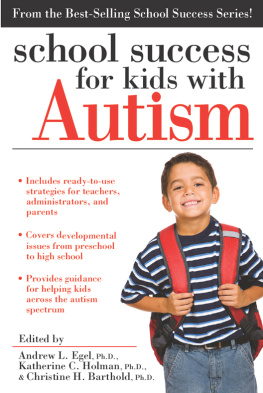HOMESCHOOLING, AUTISM STYLE
All marketing and publishing rights guaranteed to and reserved by:
(800) 489-0727
(817) 277-0727
(817) 277-2270 (fax)
E-mail:
www.fhautism.com
2020 Wendela Whitcomb Marsh & Siobhan Marsh
All rights reserved
Printed in USA
No part of this product may be reproduced in any manner whatsoever without written permission of Future Horizons, Inc., except in the case of brief quotations embodied in reviews or unless noted within the book.
ISBN: 9781885477835
eBook Designed by Acepub
This book is dedicated to
all the families who are homeschooling, autism-style.
Hang in there! You can do this!
Its also for our family, Anne and Noel,
and in loving memory of
David Scott Marsh.
AUTHOR BIOS
Siobhan is a disability advocate and Kay Snow Award-winning writer living in Salem, Oregon. Growing up with chronic illness that made on-campus education difficult, Siobhan completely restructured her homes-chooling schedule and developed many strategies which she includes in this book, allowing her to fit in doctors appointments, creative pursuits, and volunteer work while maintaining her GPA and graduating second in her class. She is also uniquely suited to discuss neurodiverse family life as the daughter and sister of autists.

Wendela is an autism educator, speaker, consultant, and author of The ABCs of Autism in the Classroom: Setting the Stage for Success and Independent Living with Autism: Your Roadmap to Success . In addition, she contributed a chapter for Autism in Lockdown: Expert Tips and Insights on Coping with the COVID-19 Pandemic , and she co-authored with Dr. Raun Melmed Autism Parent Handbook: Beginning with the End Goal in Mind . Spouse and parent to awesome autists, she lives in Salem, Oregon with her three children and two cats. Learn more about her books at www.wendelawhitcombmarsh.com and about her consultation services at PIPS for Autism, LLC: Promoting Independence & Problem Solving, www. pipsforautism.com .
ACKNOWLEDGMENTS
This book came together so quickly, our heads are still spinning. Wendela is grateful to Siobhan for the idea to write this book, for the strong push to do it, and then for agreeing to co-author it. Its so much better because of you! Thanks to our sister/aunt Cynthia Whitcomb, who proofread every chapter as quickly as we could write them. Thanks to Anne and Noel, who were supportive and encouraging while we focused on this book to the exclusion of just about everything else.
We are especially grateful to Future Horizons president Jennifer Gilpin Yacio and managing editor Rose Heredia-Bechtel. When we emailed Rose with this idea, we got a Yes on the same day. Now, barely two weeks later, we have a finished book, rushed to print for all the families who need this information now rather than six months from now. Thank you to everyone on the Future Horizons team, who went above and beyond during difficult times to help provide guidance to these families. You are awesome!
INTRODUCTION
I will get my educationif it is in home, school, or anyplace.
Malala Yousafzai
I f youre a parent of a school-aged child with autism spectrum disorder (ASD), you already know something about homeschooling. You may have been homeschooling all along, or it may have come as a surprise when your childs school was closed due to COVID-19 health and safety concerns. Perhaps your family is still sheltering at home. Youve learned to manage physical distancing, face masks, and frequent handwashing; however, your childs school may not be ready to reopen for face-to-face learning yet. If they are open but you have family members at risk, you may have chosen a home-learning option. Even if your child is able to attend school regularly during the week, they might benefit from some school-like structure during weekends and holidays. You may even be embarking on a hybrid learning journey. Whatever your reasons, youre looking for homeschooling support, autism-style.
First, go easy on yourself. Dont worry about your child falling behind academically. Everybody is facing the same situation, and no one should point a finger or blame parents if your child didnt do every worksheet provided by their teacher. Your childs safety and happiness are your primary responsibility and should be your focus right now. Love them unconditionally, hug them when they need a hug, and keep them happily occupied. Children learn all the time, not just when theyre sitting at a desk with a book in front of them.
One thing children learn is discerning when theyre being lied to. Its not necessary to share every statistic that keeps you up at night, but dont say Everythings fine when they can tell youre worried. Knowing that their grownups are worrying about something they wont talk about makes it seem like it must be too terrible for words. Their anxiety may spike as a result, and they may act out their confusion behaviorally. Some may start doing things you havent seen in a long time, like bed-wetting, babyish behavior, and two-year-old tantrums which are really autistic meltdowns. This is perfectly normal and to be expected. Kids who dont have autism are also doing some of these things all around the world right now. Whatever your family situation and whatever your childs needs, its time to step up your parent-as-teacher game now.
The book youre holding was written by an autism educator, Wendela, and her daughter Siobhan, who homeschooled herself while growing up in an autism-majority family. Siobhans Strategies throughout the book show her unique perspective and the tips and tricks that worked for her. Youll find in this book the structure and strategies you need to help you get through this time of homeschooling, autism-style.
So, lets start.
CHAPTER 1: READY
Plan for Success (Get it Down on Paper)
All things are ready, if our mind be so.
William Shakespeare
Y our childs sense of security may be aected by a need for structure. This is something you can give them, but you need to get ready before you can start. And when I say start, I mean START: Schedule Theme-based Activities at Routine Times . Get your themes and ideas ready and in writing before you start teaching. Dont try to wing it; it never goes well. Youll thank yourself later if you plan in advance exactly which theme-based activities you will schedule routinely throughout your childs day. Write it down!
CALENDAR IT
Get yourself a lesson-plan book or calendar with plenty of room to write. Plan the subjects youll need to include as part of the grade-level requirements. One important thing to realize is that a homeschool day is not nearly as long as a traditional school day. Do not, no matter your childs grade level, schedule them to do coursework from 8:00 AM to 3:00 PM five days a week. Remember, in a traditional classroom, the teacher has 30 kids to manage, teach, and try to keep on task. If your child is older, you might ask them how much time they think they spent per subject sitting around bored, waiting for their classmates to catch up, or doing what they consider pointless busywork. Now is your chance to redesign the school day to meet your childs specific needs.
SIOBHANS STRATEGIES: Individualize their schedules. Is one child a night owl who doesnt really hit their stride until noon? Schedule a lighter morning of stretching and creative activities, and save the academics for after lunch. Do you have a lark who is up and ready to go at the break of dawn but becomes sluggish in the afternoon? Get all their heavier subjects out of the way first thing, and schedule the fun stu later. You can probably finish a days worth of academics in 2-3 hours for grade school kids and 3-4 for middle and high school. For the rest of the day, they can work on things that inspire them, free reading, outdoor time, and physical activity. You may even restructure their day to allow sleeping in or taking a nap. Sleep is critical for childrens brains and health, and were all struggling to get good sleep these days.

